
Hand in Hand A-2 - Ourselves - Making our own choices
- Subject:
- Business and Communication
- Education
- Finance
- Special Education
- Material Type:
- Lesson
- Date Added:
- 01/03/2022


Hand in Hand A-2 - Ourselves - Making our own choices

Hand in Hand B-1 - Families - What is a family?

Hand in Hand B-2 - Families - Our cities

Hand in Hand C-1 - Community - Citizens and community

Hand in Hand C-2 - Community - Business and government

Hand in Hand D-1 - Our City - Banking and Money

Hand in Hand D-2 - Our City - Owning a business

Hand in Hand E-1 - Our Region - How to be an entrepreneur

Hand in Hand E-2 - Our Region - Entrepreneurs solve problems

Hand in Hand F-1 - BizTown - Getting a job

Hand in Hand F-2 - BizTown - You're Hired!
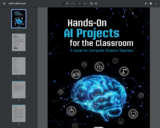
The projects in this guide use a student-driven approach to learning. Instead of simply learning about AI through videos or lectures, the students completing these projects are active participants in their AI exploration. In the process, students work directly with innovative AI technologies, participate in “unplugged” activities that further their understanding of how AI technologies work, and create various authentic products—from machine learning models to video games—to demonstrate their learning.
Project 1: Programming with Machine Learning
Project 2: AI-Powered Players in Video Games
Project 3: Using AI for Robotic Motion Planning
Project 4: Machine Learning as a Service
Visit the ISTE website with all the free practical guides for engaging students in AI creation: https://www.iste.org/areas-of-focus/AI-in-education
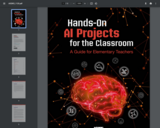
This guide provides student-driven projects that can directly teach subject area standards in tandem with foundational understandings of what AI is, how it works, and how it impacts society.
Instead of simply learning about AI through videos or lectures, the students completing these projects are active participants in their AI exploration. In the process, students work directly with innovative AI technologies, participate in “unplugged” activities that further their understanding of how AI technologies work, and create various authentic products—from presentations to designing an AI robot—to demonstrate their learning.
• Project 1: What AI Does Well and Does Not Do Well
• Project 2: Training Data and Machine Learning
• Project 3: Senses vs. Sensors
• Project 4: Navigation and AI
Visit the ISTE website with all the free practical guides for engaging students in AI creation: https://www.iste.org/areas-of-focus/AI-in-education
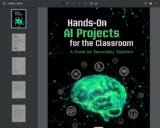
This guide provides student-driven projects that can directly teach subject area standards in tandem with foundational understandings of what AI is, how it works, and how it impacts society. Several key approaches were taken into consideration in the design of these projects. Understanding these approaches will support both your understanding and implementation of the projects in this guide, as well as your own work to design further activities that integrate AI education into your curriculum.
Project 1: AI Chatbots
Project 2: Developing a Critical Eye
Project 3: Using AI to Solve Environmental Problems
Project 4: Laws for AI
Visit the ISTE website with all the free practical guides for engaging students in AI creation: https://www.iste.org/areas-of-focus/AI-in-education
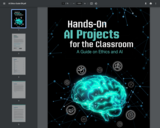
In this guide, students’ exploration of AI is framed within the context of ethical considerations and aligned with standards and concepts, and depths of understanding that would be appropriate across various subject areas and grade levels in K–12. Depending on the level of your students and the amount of time you have available, you might complete an entire project, pick and choose from the listed activities, or you might take students’ learning further by taking advantage of the additional extensions and resources provided for you. For students with no previous experience with AI education, exposure to the guided learning activities alone will create an understanding of their world that they likely did not previously have. And for those with some background in computer science or AI, the complete projects and resources will still challenge their thinking and expose them to new AI technologies and applications across various fields of study.
Project 1: Fair's Fair
Project 2: Who is in Control?
Project 3: The Trade-offs of AI Technology
Project 4: AI and the 21st Century Worker
Visit the ISTE website with all the free practical guides for engaging students in AI creation: https://www.iste.org/areas-of-focus/AI-in-education.
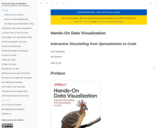
Tell your story and show it with data, using free and easy-to-learn tools on the web. This introductory book teaches you how to design interactive charts and customized maps for your website, beginning with easy drag-and-drop tools, such as Google Sheets, Datawrapper, and Tableau Public. You’ll also gradually learn how to edit open-source code templates built with Chart.js, Highcharts, and Leaflet on GitHub.
Hands-On Data Visualization takes you step-by-step through tutorials, real-world examples, and online resources. This book is ideal for students, educators, community activists, non-profit organizations, small business owners, local governments, journalists, researchers, or anyone who wants to take data out of spreadsheets and turn it into lively interactive stories. No coding experience is required.
Learn more about this open-access web edition, based on the book manuscript we submitted to our publisher, O’Reilly Media, Inc., which we have permission to freely share under the terms of our contract. Readers may purchase the publisher’s improved and copyedited version, in print or ebook editions. Figure numbering and other details vary between this open-access web edition and the publisher’s editions.
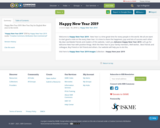
Happy New Year 2019. New Year Day for English New year in the world.
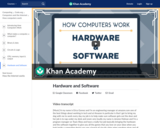
Engineering manager Erica Gomez, program manager Jerome Holman, and Microsoft founder Bill Gates explain how a computer's hardware and software work together.
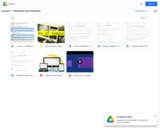
This lesson gets students thinking about the ways computer hardware and software affect our daily lives.
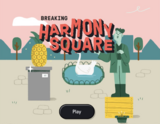
A free game that students can play at home or at school. Breaking Harmony introduces the concepts of fake news and misinformation.